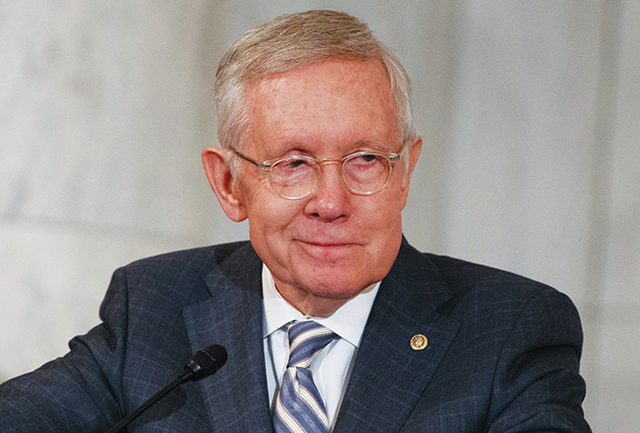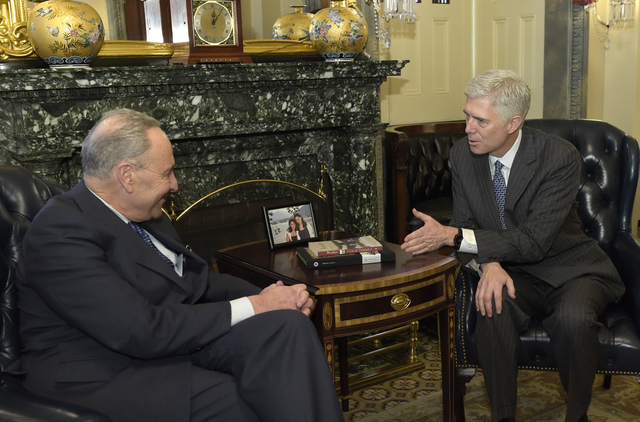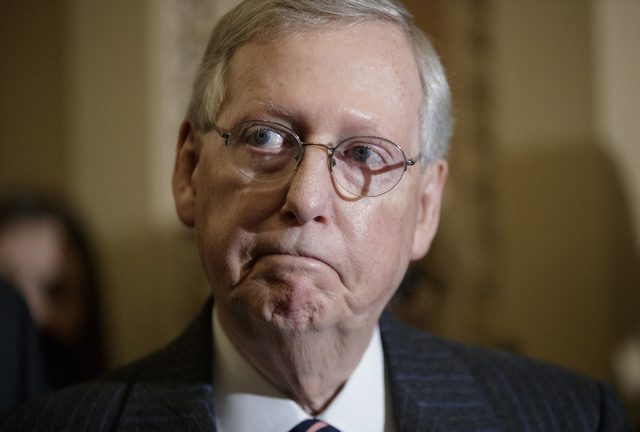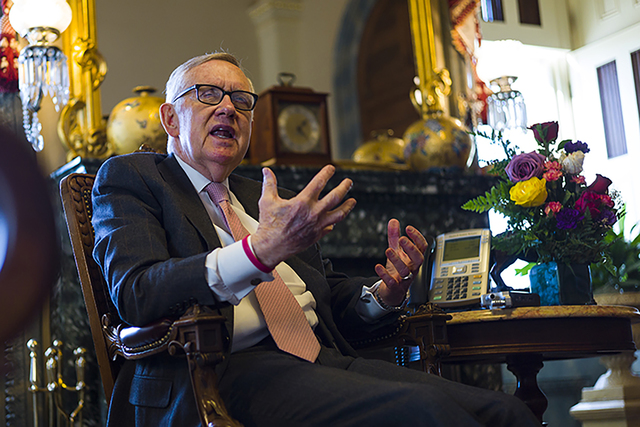’Nuclear option’ introduced by Harry Reid may be used against Democrats




WASHINGTON — Senate confirmation hearings for federal Judge Neil Gorsuch are more than a month away, but the Democratic saber rattling over a vacant Supreme Court seat has Republican leaders mulling whether they will need to detonate the “nuclear option” to fill the seat.
President Donald Trump has urged Senate Majority Leader Mitch McConnell, R-Ky., to do everything necessary to usher Gorsuch, 49, through a gantlet of hearings in a politically charged atmosphere and get him confirmed.
And McConnell has not ruled out implementing the “nuclear option,” a Senate rule change that would allow a simple majority to vote to confirm the nominee rather than a 60-vote majority currently required to install Supreme Court candidates.
The nuclear option was first used in 2013 by former Senate Majority Leader Harry Reid, D-Nev., when Republicans in the Senate blocked President Barack Obama’s lower-court judicial nominees.
It was controversial at the time, with some Democrats worried that it would be used against them when Republicans held the majority of the chamber.
In a December interview with the Review-Journal, Reid defended his decision to change Senate rules to seat judges on lower courts, knowing that the rule change could later be used against Democrats.
“I know that turnabout is fair play,” he said.
Reid said the rule change led to confirmation of 98 federal judges and helped to fill many sub-Cabinet seats in the new Obama administration.
“If I had to do it over again, I would do it again in a second,” Reid said during the interview. “Now does that mean it may work to the Democrats’ disadvantage during the Trump years? Maybe so, but that’s the way it is.”
DELAYING TACTICS
U.S. Sen. Charles Grassley, R-Iowa, plans to begin confirmation hearings for Gorsuch within six weeks. The Trump administration and Senate Republicans say a vote could occur before Easter.
McConnell predicts that Gorsuch, a federal appellate court judge in Denver, will receive the 60 votes needed for confirmation.
But Democrats have delayed confirmation of Trump’s Cabinet picks with tactics forcing the GOP to cast votes on mundane procedural matters that have prevented him from filling his team.
And the rancor between the president and lawmakers over executive orders, such as an entry ban affecting immigrants from predominantly Muslim countries, has raised the specter that Republicans may have to resort to unprecedented means to seat a Supreme Court judge.
This past week, Senate Minority Leader Charles Schumer, D-N.Y., said the president “has tested the rule of law.”
“The bar for the Supreme Court nominee to prove that he can be independent has never been higher,” Schumer said.
Schumer told reporters following a Democratic caucus meeting that he has “serious, serious concerns about this nominee.”
“Judge Gorsuch will have to earn the 60 votes,” he said.
So far, most experts on the U.S. judiciary and the Supreme Court say Gorsuch’s background and judicial temperament make him a likely confirmation.
A recent public opinion poll showed that 51 percent of likely U.S. voters believe Gorsuch should be confirmed, with 29 percent saying he should not and 20 percent undecided, according to Rasmussen Reports.
Hearings, however, will allow lawmakers to probe deeper into his background and judicial rulings.
PREVIOUS CONTENTIOUS VOTES
In 1987, Judge Robert Bork was rejected by the Senate for a seat on the Supreme Court because of his conservative ideology. And contentious hearings were held on Clarence Thomas in 1990 before he was confirmed by a narrow 52-48 vote.
President George W. Bush’s nominee, Harriet Miers, withdrew in 2005 after outrage from Senate Republicans and conservatives, including Bork.
Gorsuch is expected to receive rigorous questioning about previous rulings on the 10th Circuit Court of Appeals.
“I think a lot depends upon public perceptions and how the nominee does in the hearings,” said Carl Tobias, of the University of Richmond School of Law. “There are going to be some bumps, so I don’t think you can count to 60 yet.”
But, he added, “Gorsuch is a very attractive candidate and I think he will do well.”
Gorsuch continued to meet with senators last week, including Dean Heller, R-Nev., and Jeff Flake, R-Ariz., both of whom will be up for re-election in 2018.
Heller praised Trump for nominating Gorsuch. The senator said he would “hope to fill this vacancy with a well-qualified candidate who supports a conservative judicial philosophy.”
Gorsuch also met with Democrats as he seeks to soothe some of the partisan rancor on the Democratic side of the aisle.
CALLS FOR A FILIBUSTER
Democrats were angered last year when Republicans denied a hearing to Obama’s pick to replace Justice Antonin Scalia, who died during a February excursion to the remote Big Bend region in West Texas.
Obama nominated Merrick Garland, an appellate court judge, who was blocked by GOP lawmakers.
Liberal-leaning groups have called for a filibuster of Gorsuch to avenge the obstruction of Garland, a move that could endanger red-state Democrats who could be vulnerable in party primaries and the general election in two years.
“Any Democratic senator who votes for Gorsuch risks a primary challenge. That’s the new reality given the deep anger about, and hatred for, Trump,” said Larry Sabato, of the Center for Politics at the University of Virginia. “Our partisan polarization has deepened.”
White House spokesman Sean Spicer said the number of Democrats who have pledged to give Gorsuch a fair hearing is growing. This past week, Sen. Jeanne Shaheen, D-N.H., said Gorsuch deserves an up-or-down vote.
“That brings us now to nine total Democrats who have come out and expressed a willingness to treat Judge Gorsuch fairly,” Spicer said.
Many Democrats, Nevada’s Catherine Cortez Masto included, have not disclosed publicly how they intend to vote.
Following the nomination, Cortez Masto said Gorsuch’s views “on the issues and his full record deserves to be intensely scrutinized.”
Sabato said the hearings are going to matter.
“If Gorsuch comes across as reasonable and moderate overall, he just might get the eight Democratic votes he needs,” Sabato said.
If not, he said, “I would expect the nuclear option to be employed.”
In that event, McConnell would face the same political quandary as Reid: changing rules that may later assist Democrats if they retake control of the Senate.
“Mitch McConnell does not want to detonate the nuclear option unless he absolutely has to because he knows it may come back to haunt him or the GOP in the future,” Tobias said. “I think that he will let Gorsuch go as far as possible before Mitch McConnell even entertains the notion of using the nuclear option.”
Contact Gary Martin at gmartin@reviewjournal.com or 202-662-7390. Follow @garymartindc on Twitter.












